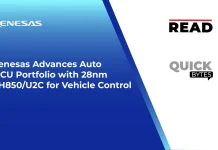QuickLogic Corporation, a developer of ultra-low power multi-core voice-enabled SoCs, embedded FPGA IP, and Endpoint AI solutions, and eTopus, a leader in high speed, low latency, low power connectivity IP, announced the industry’s first disaggregated eFPGA-enabled chiplet template solution. Based on QuickLogic’s Australis™ eFPGA IP Generator and industry-leading chiplet interfaces from eTopus, the template delivers unprecedented design flexibility and bandwidth for high performance applications.
Unlike discrete FPGAs with pre-determined resources of FPGA LUTs, RAM, and I/Os, the disaggregated eFPGA-enabled chiplet template will be available initially as a configurable IP, and eventually as Known Good Die (KGD) chiplets. Each template will be designed with native support for emerging industry chiplet interfaces including the Bunch of Wires (BOW) and UCIe standards, enabling seamless integration with a customer’s own devices. This approach enables customers to size the solution for their needs while being compatible with emerging chiplet standards.
The initial template will use the 6nm process technology to balance performance and cost. eFPGA LUT counts will start at 200K with additional functionality available in block RAM and Digital Signal Processing (DSP) blocks. Surrounding the eFPGA core will be up to 384 Die2Die links developed by eTopus. Each link can run at 0.5/4/8/16G and is organized as a x64 block to efficiently transport ethernet, PCIe, AI/ML, and compute traffic.
“By leveraging our proven Australis eFPGA IP compiler, we are now able to produce standard eFPGA-enabled chiplet templates as well as more application or customer-optimized chiplet templates in a matter of months,” said Brian Faith, president, and CEO of QuickLogic. “This positions our solution to serve a broad range of high-performance, low power applications – enabling our customers to not only size the eFPGA according to their needs, but to focus on what differentiates their products in the market.”
eTopus is developing an extended version of the BOW interface as well the new UCIe standard for low power, low latency die-to-die connectivity. It also plans to develop complementary I/O chiplets which will be available as IP and Known Good Die (KGD) with partners.






